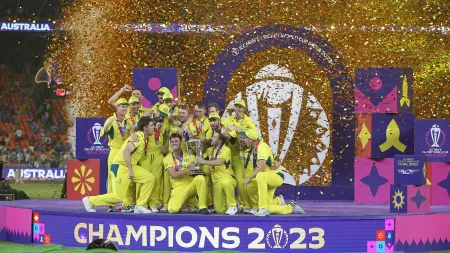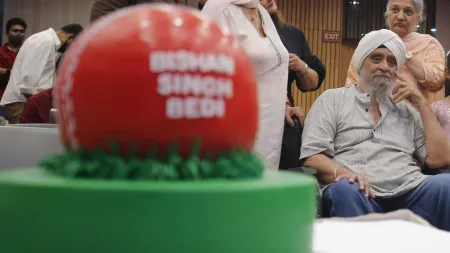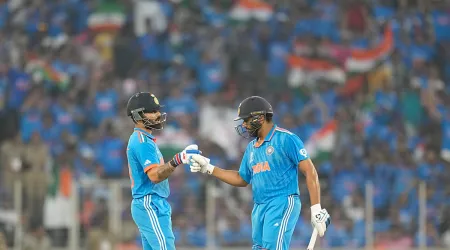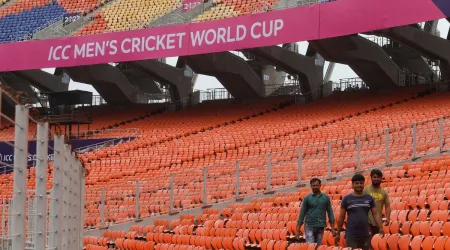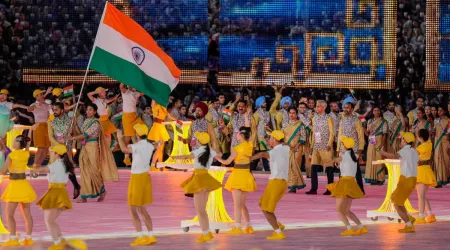- India
- International
Indian hockey team’s sticks need glue
Perceived lack of discipline, both on and off the field, could be India’s undoing as they embark on the road to Rio.
 Nestled in Shilaroo’s quaint surroundings, the SAI Centre saw Roelant Oltmans take charge of the national hockey team. (Source: Mihir Vasavda)
Nestled in Shilaroo’s quaint surroundings, the SAI Centre saw Roelant Oltmans take charge of the national hockey team. (Source: Mihir Vasavda)
Poor defence, toothless attack and abysmal penalty corner conversions are issues chief coach Roelant Oltmans is confident he can find solutions to while training in picturesque Shilaroo. But the perceived lack of discipline, both on and off the field, could be India’s undoing as they embark on the road to Rio says Mihir Vasavda.
The dark, heavy clouds that hung precariously over the mountains have dispersed, giving an ample view of the green hills with apple trees stretching as far as the eyes can see. The wind that blew across the ground moments ago too has changed its course. The air is still and hot. Vapour forms and evaporates as water from the sprinklers land on the synthetic surface of the Shilaroo SAI Centre. The harsh sun has started to beat down on the turf when Gurbaj Singh falls on his knees, skin browned and leathery from the effects of the heat. Out of breath, he somehow manages to get back on his feet. He looks around as a chorus of claps echo around the hills. His teammates stare back at him. Some in awe, some in sheer disbelief.
The Punjab Police DSP has just completed level 20 of the beep test – a cardiovascular endurance analysis common in sport to measure players’ fitness. Most others had given up by level 16 or 17. Amir Khan, one of the youngest in the team, was there till stage 19. Gurbaj outlasted them all. We are 8,000 feet above sea level, where the air is thin and carries less oxygen. On the plains, Gurbaj’s level 20 could easily have been 23 or 24, among the best scores in the test.
[related-post]
The team’s physical trainer Matthew Eyles looks at chief coach and high performance director Roelant Oltmans, standing next to him. “Easily the fittest,” he mumbles. Oltmans nods, as he scribbles some notes in his diary. “Also the most talented,” adds another member of the support staff. Oltmans just smiles.
The players walk back to the dugout in clutches, laughing, mocking each other and sipping their energy drinks. They talk about the series against France and Spain, which begins Monday. Gurbaj, however, prods along alone. He won’t be a part of the travel party. India’s fittest, in fact, is staring at another long suspension.

Since making a return two years back after spending close to 18-months in oblivion, Gurbaj has been the backbone of the side; almost as influential – if not more – as skipper Sardar Singh. But now he is seen as the key reason of the team’s functional weakness. And he doesn’t know where it all went wrong.
A Hockey India committee, acting on a report by former assistant coach Jude Felix, has begun disciplinary proceedings against Gurbaj. The charges against him are of extremely serious nature. Felix, who was with the team for nearly 18 months before tendering his resignation last Friday, believes Gurbaj is creating ‘disharmony within the team’ and accused him of nurturing ‘groupism’. He further alleged that the right-half creates rifts within the team and misbehaves with the coaches, especially the Indian staff.
For a team that is still coming to terms with the sudden departure of coach Paul van Ass, the news of Gurbaj’s ‘misconduct’ has come as a jolt. Oltmans, Sardar and rest of the team scoff at the remarks that the Indian team is a divided house and jump to the defence of the team’s best defender. “I’m shocked to hear the charges against Gurbaj,” says Sardar. Oltmans adds the accusations leveled against Gurbaj are not correct while vice-captain PR Sreejesh insists ‘he is one of the best players in the team and there’s nothing wrong in his behaviour.’
The support is reassuring for Gurbaj. But hardly comforting. In a way, this latest incident is symptomatic of a wider problem relating to trust and confidence within the team.
Indiscipline on field
Before he accepted the job last week, Oltmans knew what he was getting into. He has been with the team long enough to understand the dynamics and cliques in the dressing room. But he’s comfortable with the existing spirit within the team. If there’s something bothering him, he does well to mask it. More than fostering team spirit, however, the 60-year-old is worried about instilling discipline on field.
Poor defence, toothless attack and abysmal penalty corner conversion are issues Oltmans will — if given time and a free hand — eventually find solutions to. But the lack of discipline — perceived or real — both on and off the field, could be India’s undoing. And Oltmans realizes that. Moments after the beep test, Oltmans summons the players for his first address during a training session.
With the players huddled around him, Oltmans laid emphasis on the importance of putting interests of the team above self. “If you are with the ball and see a teammate in a better position than you, you pass it to him. Sometimes, you won’t notice it. But when you see and still don’t pass it, you will be out,” he says, pointing towards the dugout.
“You may get individual accolades outside, I care a damn shit about that. On the field, you stick to a plan and play like a team.”
He proceeds to form three teams of seven each, instructing the players to work on the defensive strategy he had designed. But within minutes of the first seven-a-side practice match, Oltmans’s worst fears come true. His 10-minute monologue had fallen on deaf ears. Most players throw the game plan down the valley and they are back to their old tricks. Oltmans walks to his assistant Tushar Khandker with a resigned look on his face knowing it’ll take more than one training session to get his message across.
Players’ inability to stick to a plan has also been one of the biggest grouses of former coaches Paul van Ass, Terry Walsh and Michael Nobbs. Under pressure, the players often panic, shun the pre-game plan and resort to mindless acts of bravado and flashiness. They lose focus cheaply, forsake structure and end up playing to the gallery.
There have been accusations against senior players of not sticking to the rolling substitutions chart, wielding their authority and thereby undermining the coach’s.
The frustrating knack of picking up soft cards for frivolous fouls at crucial junctures too has had a significant impact.
Against lesser or equal opponents, these issues are not apparent and don’t seem pressing. But India have been thoroughly exposed by higher-ranked teams like Australia, Belgium and England.
Tension, insecurities
The reasons for indiscipline on field can be traced back to the underlying tensions and insecurities among the players, which the special committee appointed by Hockey India referred to in their report. It’s hardly a new problem.
The north-south divide and senior-junior hierarchy have always split the dressing room. But never before has one player been singled out and accused in an official report of creating a rift within the team. Which is what irks Gurbaj.
At the World League semifinals in Belgium last month, he is believed to have told Sardar during one of the matches: “Tu sirf camera ke liye khelta hai (You play just for the cameras).” Gurbaj can’t recall any such exchange. Neither does Sardar. But there have been growing voices of dissent against him on similar lines, though they are still muted.
Felix’s report adds Gurbaj also addressed a group of players with a ‘bad word’, which wasn’t liked by Sardar. But the skipper believes if Gurbaj said such a thing, it must be for the good of the team. “He must not have meant any ill,” Sardar says.
Gurbaj and Sardar made their debuts in 2006, but their careers have been on opposite paths since. While Sardar, 28 and the chief playmaker, became the poster-boy of Indian hockey, Gurbaj — despite being one of the most consistent performers and a key man on the right — has inadvertently earned himself the label of being a rebel. A veteran of 200-plus international games, Gurbaj does not hesitate to speak his mind unlike Sardar, who is more cautious and guarded with his words.
One of the key reasons why India enjoyed its most successful spell in the last decade — under Walsh in 2014 — was that it was one happy unit. The positive atmosphere inside the dressing room reflected on pitch, where the team played without much fear and the players trusted each other.
That was visible in the way the players backed each other on the field, maintaining shape and structure as Walsh insisted on military-style discipline on field. The medals at Commonwealth and Asian Games further stimulated the team spirit.
The Australian’s departure also saw the desertion of this philosophy and the string of losses this year seem to have left the players frustrated, which has reflected in the performances.
In stark contrast, the reason why India finished at the bottom during the London Games is that it was a faction-ridden team. And once again, Gurbaj was at the heart of the controversy.
Unlike then, though, Gurbaj isn’t isolated this time. At least so far. “We say a lot of things to each other during and after a match. But what happens on the field, stays there. We hold no grudges on and off the field, all of us share a very cordial relationship. Whoever has made these issues public has done the wrong thing,” says a player.
Oltmans says they are creating frameworks within the team to address this issue. “Problems are there because of expectations and every player has a different way to deal with it. We always work on group dynamics and will continue that to ensure there is a positive environment in the dressing room,” he says, as he slings his bag on his shoulders.
As he walks back to the hostel along with the players, the dark and heavy clouds return and hang over the turf, symbolic of the perpetual state of the game in the country.


















